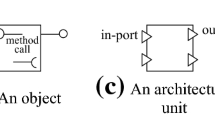Abstract
In a component-based system, connectors are used to compose components. Connectors should have a semantics that makes them simple to construct and use. At the same time, their semantics should be rich enough to endow them with desirable properties such as genericity, compositionality and reusability. For connector construction, compositionality would be particularly useful, since it would facilitate systematic construction. In this paper we describe a hierarchical approach to connector definition and construction that allows connectors to be defined and constructed from sub-connectors. These composite connectors are indeed generic, compositional and reusable. They behave like design patterns, and provide powerful composition connectors.
Preview
Unable to display preview. Download preview PDF.
Similar content being viewed by others
References
Arbab, F.: Reo: A channel-based coordination model for component composition. Mathematical Structures in Computer Science 14(3), 329–366 (2004)
Arbab, F.: Abstract behavior types: a foundation model for components and their composition. Sci. Comput. Program. 55(1-3), 3–52 (2005)
Böhm, C., Jacopini, G.: Flow diagrams, turing machines and languages with only two formation rules. Communications of the ACM 9(5), 366–371 (1966)
Bures, T., Plasil, F.: Composing connectors of elements. Technical Report 2003/3, Dep. of SW Engineering, Charles University, Prague (2003)
Bures, T., Plasil, F.: Scalable-element based connectors. In: Ramamoorthy, C.V., Lee, R., Lee, K.W. (eds.) SERA 2003. LNCS, vol. 3026, pp. 198–204. Springer, Heidelberg (2004)
Gamma, E., Helm, R., Johnson, R., Vlissides, J.: Design Patterns: Elements of Reusable Object-Oriented Software. Professional Computing Series. Addison-Wesley, Reading (1995)
Lau, K.-K., Elizondo, P.V., Wang, Z.: Exogenous connectors for software components. In: Heineman, G.T., Crnkovic, I., Schmidt, H., Stafford, J., Szyperski, C., Wallnau, K. (eds.) Proceedings of 8th Int. SIGSOFT Symposium on Component-based Software Engineering, pp. 90–106. Springer, Heidelberg (2005)
Lau, K.-K., Ornaghi, M., Wang, Z.: A software component model and its preliminary formalisation. In: de Boer, F.S., Bonsangue, M.M., Graf, S., de Roever, W.-P. (eds.) FMCO 2005. LNCS, vol. 4111, pp. 1–21. Springer, Heidelberg (2006)
Lau, K.-K., Ukis, V.: Automatic control flow generation from software architectures. In: Löwe, W., Südholt, M. (eds.) SC 2006. LNCS, vol. 4089, pp. 323–338. Springer, Heidelberg (2006)
Lopes, A., Wermelinger, M., Fiadeiro, J.L.: A compositional approach to connector construction. In: Cerioli, M., Reggio, G. (eds.) WADT 2001. LNCS, vol. 2267, pp. 201–220. Springer, Heidelberg (2002)
Medvidovic, N., Taylor, R.N.: A classification and comparison framework for software architecture description languages. Software Engineering 26(1), 70–93 (2000)
Le Metayer, D., Nicolas, V.-A., Ridoux, O.: Programs, Properties, and Data: Exploring the Software Development Trilogy. IEEE Software 15(6), 75–81 (1998)
Papadopoulos, G.A., Arbab, F.: The Engineering of Large Systems. Advances in Computers 46, 329–400 (1998)
Shaw, M., Garlan, D.: Software Architecture: Perspectives on an Emerging Discipline. Prentice-Hall, Englewood Cliffs (1996)
Spitznagel, B., Garlan, D.: A compositional approach for constructing connectors. In: WICSA 2001. In: Proceedings of the Working IEEE/IFIP Conference on Software Architecture (August 2001)
van der Aalst, W.M.P., ter Hofstede, A.H.M., Kiepuszewski, B., Barros, A.P.: Workflow patterns. In: Distributed and Parallel Databases, pp. 5–51 (2003)
Author information
Authors and Affiliations
Editor information
Rights and permissions
Copyright information
© 2007 Springer-Verlag Berlin Heidelberg
About this paper
Cite this paper
Lau, KK., Ling, L., Ukis, V., Velasco Elizondo, P. (2007). Composite Connectors for Composing Software Components. In: Lumpe, M., Vanderperren, W. (eds) Software Composition. SC 2007. Lecture Notes in Computer Science, vol 4829. Springer, Berlin, Heidelberg. https://doi.org/10.1007/978-3-540-77351-1_21
Download citation
DOI: https://doi.org/10.1007/978-3-540-77351-1_21
Publisher Name: Springer, Berlin, Heidelberg
Print ISBN: 978-3-540-77350-4
Online ISBN: 978-3-540-77351-1
eBook Packages: Computer ScienceComputer Science (R0)




